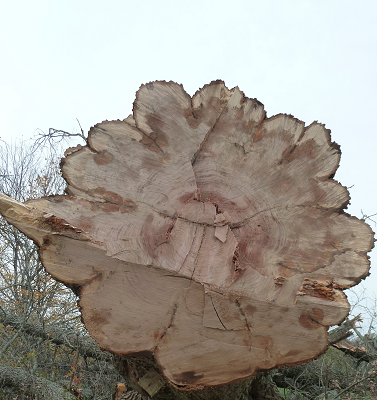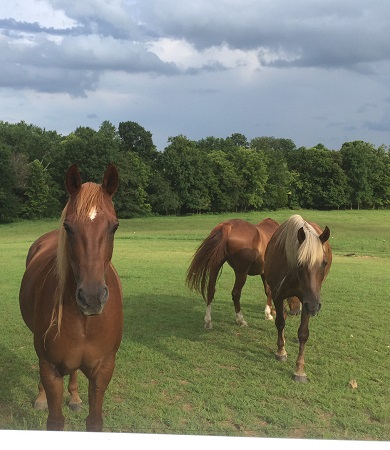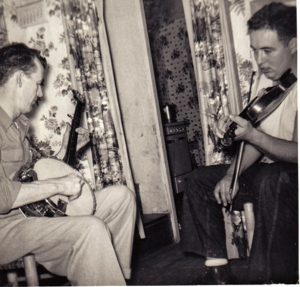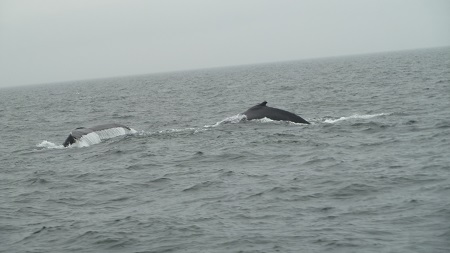Bite the Dust
 I watched an old friend bite the dust last week. He had greeted me faithfully every day for years. Standing stately and tall, the mighty oak inspired me to do the same.
I watched an old friend bite the dust last week. He had greeted me faithfully every day for years. Standing stately and tall, the mighty oak inspired me to do the same.
I knew my friend was dying.
He was many times older than me. With each new season, he grew weaker and suffered more losses. Yet, my heart hurt when he finally fell.
Oh, the stories he could have told, if only he could have talked.
- Birds born in his branches
- Children who played in his shade
- Young love ignited with spring’s new growth
- Seniors who smiled at memories shared
- Death of people, plants, and pets
 Like the circles inside his trunk, so goes life.
Like the circles inside his trunk, so goes life.
- Birth
- Childhood
- Adolescence
- Adulthood
- Death – the end of the road
We all die. Eventually we bite the dust.
However, death does not have to be the end.
When Jesus rose from His tomb on the third day, He defeated sin and death.
If we accept Jesus as Savior and Lord, we receive His victory over sin and death.
He promises an eternal home in heaven when we leave this world.
Thank you for the reminder, dear friend. I will miss you.
“‘He will wipe every tear from their eyes. There will be no more death’ or mourning or crying or pain, for the old order of things has passed away.” (Revelation 21:4 NIV).
Thanks to Jeri Stone for the photo of my friend before he bit the dust.
Do you have an expression you want explained? If so, please comment below.
Subscribe to receive my weekly posts by email and receive a free copy of “Words of Hope for Days that Hurt.”
If you enjoyed this post, please share it with your friends.
 More than one way to skin a cat sounds cruel. We don’t want our cute, fur-covered pets to suffer.
More than one way to skin a cat sounds cruel. We don’t want our cute, fur-covered pets to suffer. Congratulations to Stephen Russell, whose name was drawn from my mailing list for a free copy of Adventures in Fatherhood by Carlton Hughes and Holland Webb.
Congratulations to Stephen Russell, whose name was drawn from my mailing list for a free copy of Adventures in Fatherhood by Carlton Hughes and Holland Webb. A preschool relative visited our family years ago. She used my mother’s perfume without permission. When Mom asked what she had done, Kim beat around the bush. Over and over she responded, “I’m just tired.”
A preschool relative visited our family years ago. She used my mother’s perfume without permission. When Mom asked what she had done, Kim beat around the bush. Over and over she responded, “I’m just tired.” Many people wonder if anyone hears what they say. Their words seem to go in one ear and out the other.
Many people wonder if anyone hears what they say. Their words seem to go in one ear and out the other. My grandmother often said, “That doesn’t amount to a hill of beans.” In other words, it is not worth much.
My grandmother often said, “That doesn’t amount to a hill of beans.” In other words, it is not worth much. Like several animals (and a few people) dogs can be dangerous when suddenly wakened. Therefore, we usually let sleeping dogs lie. We leave them alone to sleep in peace.
Like several animals (and a few people) dogs can be dangerous when suddenly wakened. Therefore, we usually let sleeping dogs lie. We leave them alone to sleep in peace. My friend Pam recently made chocolate chip pancakes. In addition to chocolate chips inside the pancakes, she sprinkled extra on top. Her husband asked why. Pam said, “I guess I’m just gilding the lily.” She was trying to make a good pancake better.
My friend Pam recently made chocolate chip pancakes. In addition to chocolate chips inside the pancakes, she sprinkled extra on top. Her husband asked why. Pam said, “I guess I’m just gilding the lily.” She was trying to make a good pancake better. My dad and Uncle Millard differed in many ways. However, they were like two peas in a pod in their love for music.
My dad and Uncle Millard differed in many ways. However, they were like two peas in a pod in their love for music. In addition to shared interests, like Dad and Uncle Millard, two peas in a pod may:
In addition to shared interests, like Dad and Uncle Millard, two peas in a pod may: Many times we feel like we are drowning in a sea of responsibility. The storms of life hit. We have too much to do with too little time or energy to do it. Yet, we keep on keeping on.
Many times we feel like we are drowning in a sea of responsibility. The storms of life hit. We have too much to do with too little time or energy to do it. Yet, we keep on keeping on. Other storms remain with us.
Other storms remain with us. They choose a slower, more relaxed lifestyle.
They choose a slower, more relaxed lifestyle.